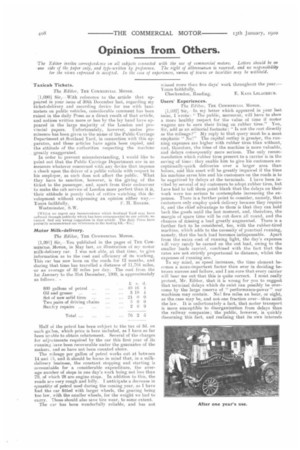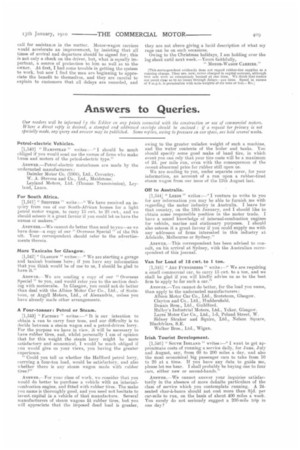Opinions from Others.
Page 18

Page 19

If you've noticed an error in this article please click here to report it so we can fix it.
Editor invites corresPondence on all subjects connected with the use of commercial motors. Letters should be on
side of the Paper only, and type-written by preference. The right of abbremtation is reserved, and no responsibility for the views expressed is accept-el. In the case of experiences, names of towns or localities may be withheld.
Taxicab Tickets.
The Editor, Tun COMMERCIAL MoTorn
[1,0903 Sir,—With reference to the article that appeared in your issue of 30th December last, regarding my ticket-delivery and recording device for use with taximeters on public vehicles, considerable comment has been raised in the daily Press as a direct result of that article, and notices written more or lees by the lay hand have appeared in the large majority of the London and provincial papers. Unfortunately, however, undue prominence has been given to the name of the Public Carriage Department at Scotland Yard, in connection with this apparatus, and these articles have again been copied, and • the attitude of the authorities respecting the machine • greatly exaggerated.
In order to prevent misunderstanding, 1 would like to point out that the Public Carriage Department are in no measure whatever concerned with any device that imposes a check upon the driver of a public vehicle with respect to his employer, as such does not affect the public. What they have to sanction, however, is the giving of the ticket to the passenger, and, apart from their endeavour to make the cab service of London inure perfect than it is,
• their attitude is purely that of critics watching this development without expressing an opinion either way.— Yours faithfully, F. H. ROGERS. Westminster, S.W.
I-Whilst we regret any inconvenience which Scotland Yard may have sutreied through publicity whIch has been consequentml to our article, we cannot find any wrung suggestion in that article. The daily Press have probably misconstrued our references to the testing kit.—En.1 Motor Milk-delivery.
The Editor, THE CONIMERCIAL MOTOR.
.[1,091] Sir,—You published in the pages of THE COM14.ERCIAL Mown, in May last, an illustration of my motor milk-delivery car. I was not able, at that time, to give information as to the met and efficiency of its working. This ear has now been on the roads for 12 months, and during that time has travelled a distance of 11,704 miles, or an average of 32 miles per day. The cost from the 1st January to the 31st December, 1909, is approximately as fellows.
Half of the petrol has been subject to the tax of 3d. on -each galon, which price is here included, as I have so far been unable to obtain rebatement. Several of the charges for adjustments required by the car this first year of its running :lave been recoverable under the guarantee of the makers, and so have not been counted above.
The mileage per gallon of petrol works out at between 14 and LI, and it should be borne in mind that, in a milkdelivery business, the constant stopping and starting is accountable for a considerable expenditure, the average number of stops in one day's work being not less than 70, of which 28 are engine stops. In addition to this, the roads are very rough and hilly. I anticipate a decrease in -quantity of petrol used during the coming year, as I have had the car fitted with larger wheels, the gearing being too low, with the smaller wheels, for the weight we had to ,cerry. These should also save tire wear, to some extent.
The car has been wonderfully reliable, and has not missed more than five days' work throughout the year.— ours faithfully,
Checkendan, Reading. E. KATE LELACHECE, Users' Experiences.
The Editor, THE COMMERCIAL MOTOR.
W02] Sir,--In my letter which appeared in your last issue, I wrote: " The public, moreover, will have to show a more healthy respect for the value of time if motor wagons are to earn their living on rubber tires." You, Sir, add as an editorial footnote: " Is not. the cost directly as the mileage?" My reply to that query must be a most emphatic " No I" The capital outlay is greater, the running expenses are higher with rubber tires than without, and, therefore, the time of the machine is more valuable, and delays consequently more serious. The only recommendation which rubber tires present to a carrier is in the saving of time: they enable him to give his customers exceptionally-quick deliveries over a larger area than before, and this asset will be greatly impaired if the time his machine saves him and his customers on the roads is to he negatived by delays at the terminals. I have been invited by several of my customers to adopt rubber tires, but Lave had to tell them point blank that the delays on their work were too serious to contemplate increasing the expenses. There is a further point to consider, namely, that customers only employ quick delivery because they require it, and the chief advantage to them is that they can hold back the goods until the last moment, and, therefore, the margin of spare time will be cut down all round, and the chances of missing a load greatly augmented. There is further fact to be considered, too, with the rubber-tired machine, which adds to the necessity of punctual running, namely, that the back load becomes indispensable. Apart from the extra cost of running light, the day's expenses ;till very rarely be earned on the out load, owing to the smaller loads carried, combined with the fact that the rates are not strictly proportional to distance, whilst the expenses of running are.
To my mind, as speed increases, the time element becomes a more-important factor than ever in deciding between success and failure, anti I am sure that every carrier will bear me out that this is quite correct. I must really protest, Mr. Editor, that it is wrong for you to suggest that terminal delays which do exist can possibly be overcome by the large reserve of "performance-power" our machines may contain. No! five miles an hour, or eight, RR the case may be, and not -one fraction over—thus saith the law. It is unfortunately a fact, that motor transport is more susceptible to disorganization from delays than the railway companies; the public, however, is quickly discerning this fact, and realizing that its own interests
call for assistamae in the matter. Motor-wagon carriers would accelerate an improvement, by insisting that all times of arrival and departure should be signed for ; this is not only a check on the driver, but, what is equally important, a source of protection to him as well as to the owner. At first, I had some trouble in getting the system to work, but now I find the men are beginning to appreciate the benefit to themselves, and they are careful to explain to customers that all delays are recorded, and they are not above giving a lucid description of what my rage can be on such occasions. Owing to the Christmas holidays, I am holding over the log sheet until next week—Yours faithfully,
44 MOTOR-WA DON CARRIER."
This correspondent evidently does not regard rubber-tire supplies as a running charge. They are, now, never charged in capital account, although first sots were so erroneously booked at one time. We think that makes our point clear as to no losses through delays—qua tires. Speed in excess of 8 m.p.h. is permissible with axle-weights of six tons or less.– En.]






















